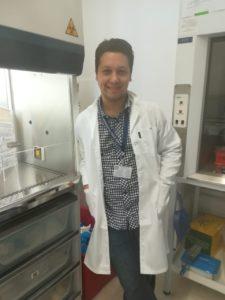 Our December Immunologist of the month is Nashied Peton from the University of Cape Town (UCT), South Africa. Dr Peton is an early career research scientist based at the Wellcome Centre for Clinical Infectious Diseases Research Initiative (CIDRI-Africa), UCT.
Our December Immunologist of the month is Nashied Peton from the University of Cape Town (UCT), South Africa. Dr Peton is an early career research scientist based at the Wellcome Centre for Clinical Infectious Diseases Research Initiative (CIDRI-Africa), UCT.
Dr Peton gained his PhD in Molecular Biology in 2013 under the mentorship of Professor Jonathan Blackburn in the Department of Integrated Biomedical Sciences at the University of Cape Town. After being awarded a one year training fellowship by the Carnegie Corporation in 2015, he joined the Wellcome Centre for Clinical Infectious Diseases Research Initiative (CIDRI-Africa) where he began training as an infectious disease immunologist under the supervision and mentorship of Professor Robert John Wilkinson and Honorary Associate Professor Anna Kathleen Coussens.
In 2016, Dr Peton became the recipient of a Royal Society training grant where he spent 4 months at the Francis Crick Institute in London learning the innovative CRISPR/Cas9 technology with Dr Eva Maria Frickel. In 2017, Dr Peton was awarded a 3-year Carnegie Corporation early career fellowship, and also obtained his HPCSA accreditation as a medical biological scientist in molecular biology. He is now a research fellow at CIDRI-Africa.
Research Focus: Dr Peton’s research focus is on Tuberculosis (TB) and HIV-1 host-directed therapies. He is investigating the human macrophage response to infection, specifically how HIV perturbs the macrophage response to Mycobacterium tuberculosis (Mtb) and how modulating the host response can enhance pathogen clearance and prevent pathogen induced cell death. Dr Peton also aims to develop robust in vitro models of infection where he will utilize Induced Pluripotent Stem Cells (IPSCS) to better study the host-pathogen interactions and identify potential targets for host-directed therapies to TB.
Why did you choose to become an immunologist and what are your research interests?
I was awarded my first postdoctoral fellowship through the National Research Foundation (NRF) and took up a fellows position within the Plant Molecular Physiology group at UCT under the supervision of Professor Jill Margaret Farrant. After 12 months I switched career fields based on my desire to develop my career toward infectious disease immunology. I therefore approached CIDRI-Africa in 2015 to host me as a Post-Doctoral Research Training Fellow after being awarded a Carnegie Corporation Next Generation Academics 1-year training fellowship. This fellowship allowed me to gain the fundamental training and experience needed to successfully transition into the infectious disease immunology research field. Understanding the mechanisms that govern the body’s response to infection at the molecular and cellular level has always intrigued me, and has been one of the main reasons why I have pursued this career path.
Interview by Dana Savulescu










